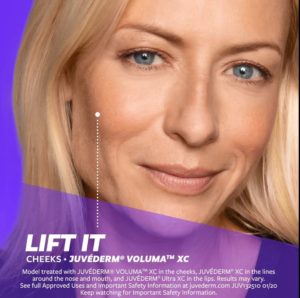
These days, it’s as easy to schedule a consultation for injectable wrinkle reducers and filler as it is to sign up for Spotify® — but, unlike a streaming music service, the questions you’ll have beforehand will (and should) be a little more serious than, “Can you play Britney Spears?” After all, this is your face. And whether you’re interested in learning about injectable wrinkle reducers, which temporarily smooth the look of moderate to severe wrinkles, or testing a filler that temporarily adds volume, you need to be up to speed on the benefits, potential risks, and side effects.
EDITOR’S NOTE
Injectable wrinkle reducers temporarily smooth the look of moderate to severe wrinkles in certain areas of the face, including the forehead, frown lines, and crow’s feet; they should not be used more frequently than every three months. Injectable filler is a temporary treatment that adds volume to areas of the face such as the lips, cheeks, and laugh lines. Like any medical treatment, both injectable wrinkle reducers and injectable fillers have potential risks and side effects. Talk to a licensed provider to see if they’re right for you.
To help get the final look that you want, it’s absolutely essential that you ask your injectionist any questions you might have. And we’re about to make your life easier: we did some of that research for you when we consulted board-certified plastic surgeons across the U.S. They offered the most frequently asked questions they hear during consultations, as well as their professional responses. And remember — whether it’s wrinkle reducers or fillers, be sure to talk to your doctor about all the risks and benefits to determine if they’re right for you.
Will I still look like myself if I get injectable wrinkle reducers?
“The most common concern patients have is they’re afraid of looking ‘done.’ They’re afraid of [not] looking [like themselves after treatment],” says New York City-based board-certified plastic surgeon Michael Kane, MD, explaining that many patients have that fear because they have seen less-than-desirable outcomes. When the treatment is done well, however, he explains you can have subtle results.
Will injectables hurt?
Honestly, it depends on which type of injectables are being used, and the experience of each individual being injected. Columbus-based board-certified plastic surgeon Robert Heck, MD, likens the feeling of getting injectable wrinkle reducers to a “little bee sting” or pinch that is usually well-tolerated. While, on the filler side, Charlotte-based board-certified plastic surgeon Stephan Finical, MD, says that doctors typically opt for a topical anesthetic. Many of the experts we interviewed pointed out that a lot of fillers also have a local anesthetic built in to make the procedure even less uncomfortable. However, if you do experience any unusual pain, they said to be sure to immediately inform their licensed provider.
Is it too soon for me to start trying wrinkle reducers? Is it too late?
While everyone forms wrinkles a bit differently, for adults over the age of 18, there is no set time to start other than your provider determining that you are an appropriate candidate.
“We’re actually seeing a significant growth in [younger] adult patients, particularly millennials, that are [candidates] for wrinkle reducers and fillers,” says Houston-based board-certified plastic surgeon Bob Basu, MD. “They’re definitely part of the selfie culture. They’re quite conscious about their appearance, but they’re also highly educated about their options.”
Overall, however, Dr. Kane says that an appropriate time to start using wrinkle reducers is when you see moderate to severe wrinkles that are apparent even after you’ve stopped animating your face. “I tell my patients all the time, [young adults] have crow’s feet when they’re smiling. [But, when they stop, those crow’s feet should go away.] What bothers us is when we’re not smiling and those wrinkles are still there.”
And no, it’s never too late to consider injectables!
How long will wrinkle reducers and fillers last?
For wrinkle reducers, retreatment may be desired every three to four months, though it should not be given any sooner than that. For fillers, most tend to last from six months to a year — or even two years — depending on the type of filler and area of the face treated. Fort Worth-based board-certified plastic surgeon Steven Camp, MD, tells his patients that all injectable treatments are temporary and will eventually require retreatment to achieve the same results.

Does not imply person featured in photograph had either treatment mentioned in this article.
Will fillers make my face look fat?
An overly plumped look is less than ideal: “Chipmunk cheeks” isn’t just a pesky childhood nickname — it can also be a byproduct of poorly done fillers. That’s why it is essential to seek out a highly skilled licensed provider for your procedure, who will know whether filler is your best choice for adding volume, or if you should be seeking out other options.
“[Properly injected fillers can] replace volume loss in certain areas, but can’t [treat every issue],” says Louis P. Bucky, MD, board-certified plastic surgeon located in Philadelphia. “When you’re overfilling to try and make up for other aging changes, you can get into the trouble of having an overfilled or [fat-looking] face.” Still unclear? Ask your injection specialist if fillers will give you the results you’re looking for.
Are injectable wrinkle reducers safe?
Injectable wrinkle reducers are FDA-approved prescription treatments for adults to temporarily reduce the appearance of moderate to severe wrinkles in certain areas of the face. “It’s important to know that [injectable wrinkle reducers are] a purified laboratory product.” However, as always, be mindful that there are risks associated with wrinkle reducers, so it’s important to talk to your doctor about them, as well as the benefits to see if they’re right for you.
Doctors Michael Kane and Stephen Finical are paid Allergan® consultants.
Original article can be found at our partner site here.